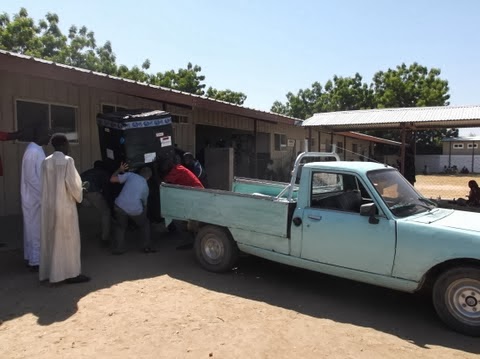.jpg) |
| The route from the hospital to town, passing between two villages. For most of the year it is dry and sandy. |
Twenty hours ago, my friend Sue and I left the hospital at
Guinebor to go into town to run a few errands and go to a friend’s house for
the afternoon. The trip to town, for much of the year, is an uneventful 20
minute journey, initially made up of 7 kilometres of sandy tracks passing
through a couple of small villages before reaching the faster and more
predictable (in surface, though not necessarily the fellow road users style of
driving!), roads. However, at the recent arrival of the rains and their
increasing frequency and strength, the surrounding landscape has become more
lush and green, while the once sandy tracks have taken on an increasingly
muddy, watery, clayey and all round unpredictable character. This makes for a
far more interesting, potentially exciting, but also uncertain journey- will
the route be clear? Will I come out the other side of this puddle, or will I
fall into a submerged pothole? Will I get stuck in thick stinking mud? And if I
do, will anyone come to help me, or, as they did in the first wet season here,
will they just line up to watch the white girl sit helplessly in her car and
laugh?! (One of my more humbling moments!)
Having a second person in the car with me and a rope at the
ready in the boot, I felt confident as we set out yesterday. The roads, as
expected had deteriorated since I had last left the hospital following a day of
continuous rain. But with 2 pairs of eyes on the lookout for the best way
forward, I was able to enjoy the experience of slipping and sliding my way to
successfully pop out the other side of the villages onto the paved roads, all
the while, smugly reflecting on the fact that in the UK, people pay good money
for a days’ off road driving experience!
Things were going well, the sky was blue, not a cloud to be
seen, the sun, as usual, was shining and the required errands were being ticked
off the list. But then the winds began to pick up. The clouds began to gather
and darken. And the distant rumbling of thunder became ever closer. As we sat
in my friends lounge, the worried glances of mine and Sue’s faces were quickly
noted by others, but as the rain began to stream down, there was nothing we
could do but wait until the worst had passed.
Though heavy, the rain had not lasted long so we headed home
once it had stopped, once again feeling confident that we would be able to negotiate
our way through the quagmire that the roads had no doubt become. That was until
we received a phone call from Sue’s husband, who, back at Guinebor, was ladling
rain water out from their house, where the storm was so heavy, rain was seeping
through the walls, as well as pouring through the windows. The space between
our two houses had disappeared into a knee deep lake, totally surrounding my
house. Beyond the hospital walls, the land had taken on a distinctly more
oceanic character. Getting back home for
us, was now not an option.
An urgent phone call to a friend based in town saw us well
looked after for the night, where unfortunately, the circumstances surrounding
our impromptu stay, diminished the delight of satellite TV, air conditioning
and an extremely comfortable bed… but only slightly. If you have to be stuck in
town for the night, there were definitely worse places to be….!
As is often the case here, our unplanned stay in town was not the only challenge, but was also accompanied by the house we
were staying in to randomly loose all power and then in
the morning, following a phone call to confirm that after no further rains the
roads were passable again, my car wouldn't start!
However, Dago, the hospital driver, and once again, my knight in long Arabic dress, within a mud covered rattley Rav 4, came to the rescue! With my car up and running once again, we set off in convoy to conquer the watery challenge of Guinebor! It was incredible to see just how much it had dried out overnight, for though it was worse than our exit journey yesterday and there were dodgy moments of following a skidding and half submerged Dago, the route was not vastly worse than the day before.
.jpg) |
| The rains dramatically change the landscape, causing houses to flood and routes to become impassable. |
.jpg) |
| After a night of no rain the route had significantly improved allowing us to drive home |
All that was left to do once safely and dryly back home, was
to feed a rather unhappy and hungry cat, assure myself that no permanent damage
had been caused to the house and unpack the groceries that I felt like I had
brought the week previously, and not, as was actually the case, only twenty
hours ago.
.jpg) |
| The lake of Guinebor! Home, sweet watery home. |

.jpg)
.jpg)
.jpg)
.jpg)
.jpg)
.jpg)
.jpg)
.jpg)
.jpg)
.jpg)
.jpg)
.jpg)
.jpg)
.jpg)

.jpg)
.jpg)
.jpg)

.jpg)
.jpg)
.jpg)
.jpg)